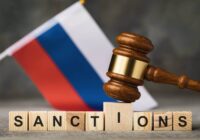As we enter an uncertain period in the history of the world, it is worth looking back to understand the present.
As Russia and Turkey attempt to broker a peace settlement in Syria without the involvement of the United States, some are wondering if the axis of influence in the world is shifting from the Atlantic to the center of Asia.
Like many others, I enjoyed reading the bestseller, The Silk Roads: A New History of the World by Peter Frankopan.
The period the book covers runs from the time of the Babylonian Empire right up to the present day. The area it covers is everywhere between Ireland and Vladivostok, and between the Indian and Arctic Oceans. The center of that world is somewhere near the Caspian Sea. The constant theme throughout the whole time is a struggle within this huge area—for resources and for the means of contact with the outside world.
The rivalry between the Roman and Persian Empires is described. So too is the rise of Islam, and the claim is made that Islam succeeded partly because it provided Arabs with a unifying identity in places of the rival religions and heresies that predated it.
The claim is made that Jews in Palestine initially welcomed Muslim rule. Indeed it is noteworthy that, 700 years later, Jews fleeing Christian Spain found refuge in Muslim-ruled Greece.
The role of Genghis Khan is described and it is claimed that, after the initial disruption, Mongol dominance gave relative stability to Central Asia. The Mongols did not come all the way to Western Europe because they found much richer lands to conquer in India and China.
Russia’s constant fear of being encircled, or hemmed in, within the Eurasian landmass is also examined. After its defeat in the Crimean War in 1856, peace terms were imposed on Russia by the victorious British, French and Ottomans, who closed the Black Sea to the Russian navy. This was despite the fact that the Black Sea was the exit route for a third of Russia’s exports. This remained a huge grievance for the Russian leadership, and a similar feeling of being hemmed in lies behind Russian tactics today in respect of Crimea and Syria.
Adolf Hitler, who remembered the starvation in Germany during the First World War, was determined—as one of his war aims—to seize the grain growing regions of Ukraine and southern Russia. His plans in this respect were well signaled in his book, Mein Kampf, which he wrote in the 1920s and which Joseph Stalin had read. But Stalin did not draw the logical conclusion and was caught off guard when Hitler attacked the Soviet Union in 1941.
THE SILK ROADS
The thesis of The Silk Roads is that world politics rotates around the struggles for the control of food, energy and mineral resources on the Eurasian land mass. This is in contrast to a view that would see the Atlantic as the axis of political and economic power.
 From the very beginning of this story, peoples in Eurasia were changing sides, finding new allies and adopting different religions. Inconsistency was the one constant among the players of this great game.
From the very beginning of this story, peoples in Eurasia were changing sides, finding new allies and adopting different religions. Inconsistency was the one constant among the players of this great game.
For example, in view of the present-day obsession in the US and Israel over Iran and its potential for nuclear capacity, we are reminded that, in 1974, President Gerald Ford agreed to sell American nuclear reprocessing technology to Iran. That was at the time of the shah, who was overthrown five years later, but the geostrategic risk of proliferation inherent in selling such technology to Iran under any regime was the same then as it is now.
Interestingly, President Ford’s chief of staff at the time was Dick Cheney.
As we move toward a more uncertain world, reading this book will help you to be a little less surprised by what happens—because you will learn that something rather like it happened before.
The views expressed in this article are the author’s own and do not necessarily reflect Fair Observer’s editorial policy.
Photo Credit: Tonefotografia
Support Fair Observer
We rely on your support for our independence, diversity and quality.
For more than 10 years, Fair Observer has been free, fair and independent. No billionaire owns us, no advertisers control us. We are a reader-supported nonprofit. Unlike many other publications, we keep our content free for readers regardless of where they live or whether they can afford to pay. We have no paywalls and no ads.
In the post-truth era of fake news, echo chambers and filter bubbles, we publish a plurality of perspectives from around the world. Anyone can publish with us, but everyone goes through a rigorous editorial process. So, you get fact-checked, well-reasoned content instead of noise.
We publish 2,500+ voices from 90+ countries. We also conduct education and training programs
on subjects ranging from digital media and journalism to writing and critical thinking. This
doesn’t come cheap. Servers, editors, trainers and web developers cost
money.
Please consider supporting us on a regular basis as a recurring donor or a
sustaining member.
Will you support FO’s journalism?
We rely on your support for our independence, diversity and quality.






